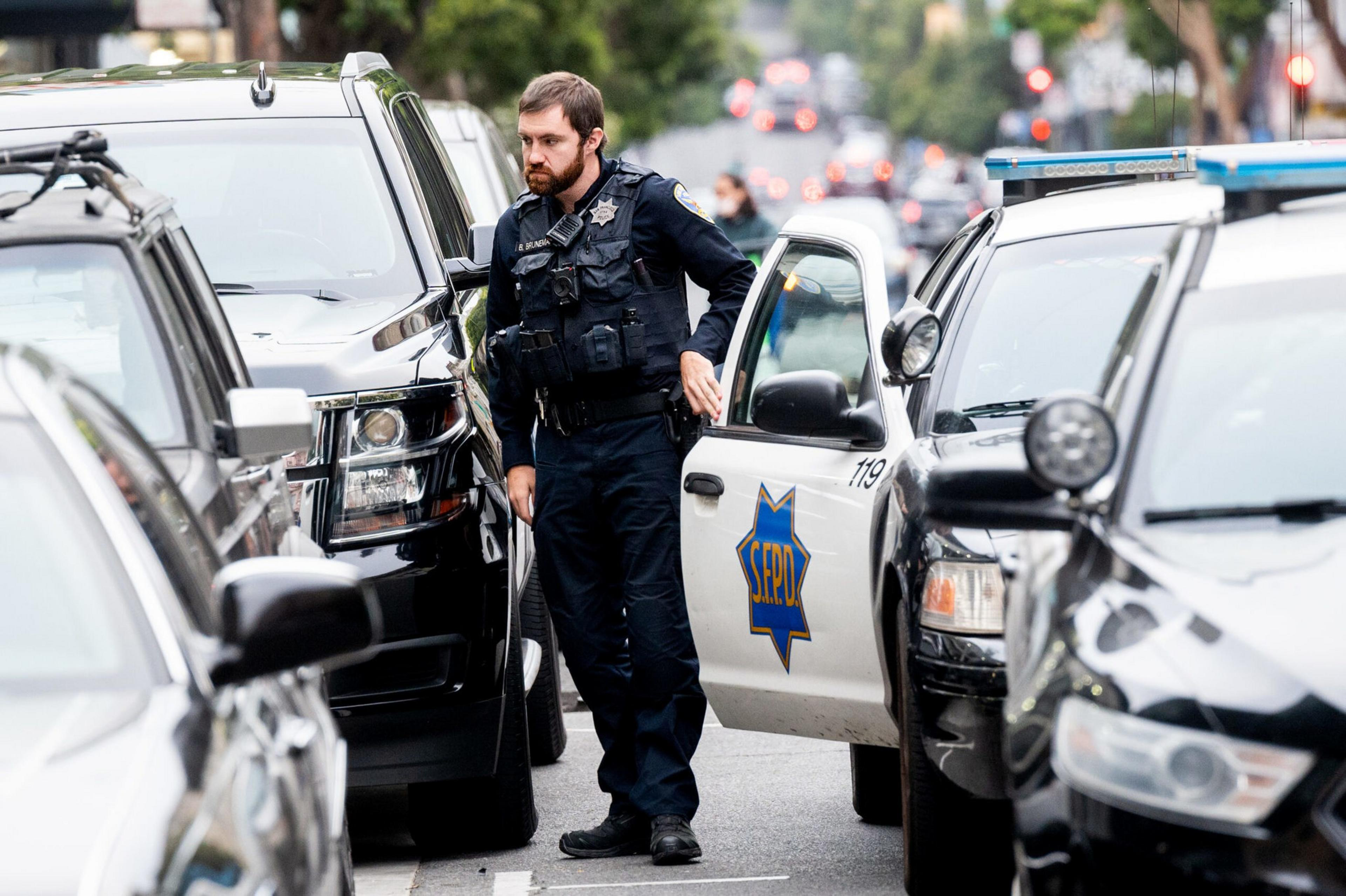San Francisco police have begun citing and arresting drug users—not just dealers—as part of a strategy meant to disrupt the “open-air” drug markets that dominate blighted pockets of downtown.
The tactic, which appears to have rolled out in the past month using federal funding SFPD secured in February, marks a departure for an agency that has regularly allowed users to inject or smoke substances in public.
While police are mostly ticketing users and taking away their drugs and paraphernalia, officers have also started arresting those with outstanding warrants or who are violating terms of their release in open criminal cases, SFPD Chief Bill Scott said.
“We want people who are addicted to get help,” Scott said. “I very much understand harm reduction. But we have to disrupt this activity because the bottom line is it’s going unabated, we have had a significant spike in deaths, and I’m not saying by any stretch of the imagination that the police department is going to solve that problem, but I think we can disrupt it.”
The move appears to explain the unusual slew of more than a dozen standalone possession-of-paraphernalia cases the District Attorney’s Office filed in recent weeks. While the office filed those charges, newly appointed District Attorney Brooke Jenkins, who was sworn in on July 8, said she did not direct her staff to do so and ordered prosecutors this week to dismiss the cases.
Scott detailed his plans for the first time Wednesday at the Police Commission. His announcement drew criticism from members of the civilian oversight body and at least one harm-reduction proponent who blasted the move as a return to the “war on drugs.”

Scott said his effort is a response to skyrocketing overdose deaths in San Francisco largely due to the proliferation of fentanyl, as well as the constellation of violent crimes linked to downtown’s visible drug markets.
Police have made roughly 300 arrests for drug sales in the Tenderloin this year and cited over 150 people since July for using drugs out in the open, Scott said. Some of those users have been arrested as well, mostly for warrants.
SFPD issued 42 paraphernalia citations in June, according to department data, compared to seven in May and three in April.
The crackdown is being funded in part by a $125,000 grant from the U.S. Department of Justice Office of Community Oriented Policing Services that the department applied for months ago, according to Scott. The grant expires sometime in August.
The decision to seize drug paraphernalia from users appears to fly in the face of city-funded harm-reduction efforts to reduce the spread of disease among users by handing out clean needles, foil and other equipment.
“That’s wildly counterproductive and goes against absolutely everything that we know works and doesn’t work,” Laura Thomas, a director of harm reduction with the San Francisco Aids Foundation, said in a phone call with The Standard. “There’s a widespread saying that we can’t arrest our way out of this problem, and in fact I’m pretty sure I’ve heard Chief Scott say those words before.”
Thomas described the strategy as being the “war on drugs—and we all know that that doesn’t work.”

Public Defender Mano Raju thought the “war on drugs” had already restarted (opens in new tab) earlier this week after the new hard-on-crime District Attorney’s Office filed charges against more than a dozen people who had been cited for possession of drug paraphernalia. Raju condemned the charges in what he saw as an attack on people who need treatment, not jail time.
But the situation turned out to be more complicated than it initially seemed.
The charges were due to one assistant district attorney who erroneously filed in those 17 cases for no crimes other than possession of drug paraphernalia.
Officials said the mistake was due to a now-fired employee, who directed the prosecutor to seek approval before dismissing standalone misdemeanor charges. When police began their new push, that prosecutor filed standalone charges instead of dismissing the cases as directed amid a vacuum in leadership as the office transitioned from recalled District Attorney Chesa Boudin to Jenkins.
Jenkins said she directed prosecutors to immediately withdraw those charges after finding out about the cases because they ran afoul of office policy.
“I am focused on holding serious drug dealers—particularly those dealing fentanyl—accountable,” Jenkins said earlier this week, “and not targeting and incarcerating those suffering from addiction.”
